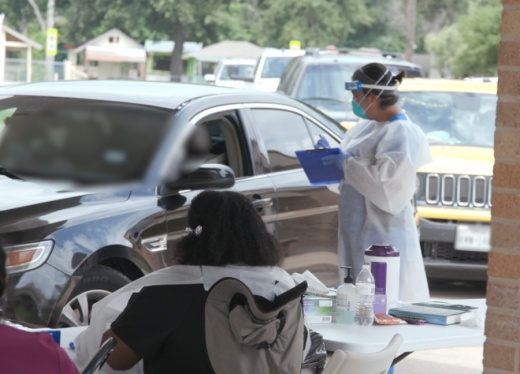A recent Commissioners Court meeting highlighted this discrepancy, with Precinct 3 Commissioner James Noack calling testing asymptomatic individuals a “waste of time and resources.”
On June 23, commissioners discussed approving an interlocal agreement June 23 between Montgomery County and the county’s hospital district to provide support for emergency equipment, medical supplies, diagnostic testing and other related healthcare support. At this time, the county will supply $100,000 to the hospital district, said Jason Millsaps, chief of staff for County Judge Mark Keough, said in an email.
Currently, MCPHD offers a voucher program for residents that has resulted in about 12,000 coronavirus tests through local testing sites. The interlocal agreement would expand on this capability by allowing more symptomatic and asymptomatic people to get tested, Millsaps said.
Noack—who has been vocal about reducing government spending on various issues, including pay raises for county staff—said he disagreed with allocating resources for more testing.
“All that does is drive up the results, and you find out that you got a lot of positive people that aren’t sick. What the hell’s the point in that?” he asked.
Millsaps responded that there are two reasons: For one, asymptomatic people identified can be immediately isolated to prevent infecting others, and secondly, the more tests that are done, the better the county can understand the scope and spread of the disease.
“Testing everybody will give us a clearer picture of our actual positivity rate [the ratio of positive cases to total tests],” Millsaps said.
This view is generally agreed upon by health experts and officials. Angela Clendenin, an instructional assistant professor in the Department of Epidemiology and Biostatistics at Texas A&M University, said the best way to contain an infectious disease is to test every individual.
“There needs to be widespread robust testing of everybody,” she said in an interview with Community Impact Newspaper. “Then, we need to be able to identify those positive case.”
But overall testing demand has dropped in Montgomery County. Millsaps estimated that about 17% of the county’s vouchers have been used as of June 23. Community Impact Newspaper also previously reported that at least one drive-thru testing center, America’s ER in The Woodlands, closed due to a lack of demand.
Yet according to data from MCPHD, Montgomery County has been reporting more and more cases each day and has recorded a higher seven-day new case average since June 9.
Noack said he does not want asymptomatic individuals spreading the disease but reiterated his belief that the county should direct its time and resources elsewhere.
“We don’t want people running around spreading the virus, but at the same time, to test just so our statistical sampling looks better is kind of silly,” Noack said. “Why don’t we screen everybody else for heart disease or cancer while we’re at it? It’s a waste of time and resources to asymptomatically test people.”
But government officials have used positivity rates—which factor in total tests—to make key decisions and policies regarding coronavirus restrictions. The more tests that are reported, the more accurately the true positivity rate can be assessed, Millsaps said.
On June 25, Texas breached a seven-day average positivity rate of 10%—a level that Gov. Greg Abbott had previously deemed unacceptable. That same day, Abbott temporarily halted any further phases in reopening the state.
According to reporting by The Texas Tribune, Community Impact Newspaper’s partner, Abbott had called the 7-day average positivity rate “one of the most important data points” and one officials would watch as the state reopened.
“This temporary pause will help our state corral the spread until we can safely enter the next phase of opening our state for business,” Abbott said June 25.
Commissioners did ultimately approve the interlocal agreement June 23. Judge Keough said it would be in the best interest of public to expand testing capabilities.





